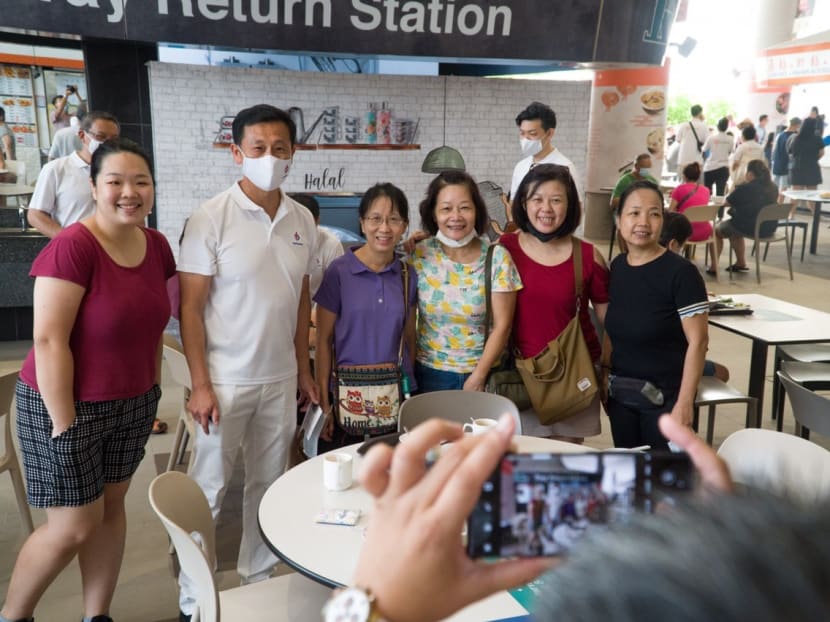GE2020: Use objective outcomes to assess Government’s handling of Covid-19, says PAP’s Ong Ye Kung
SINGAPORE — Amid questions raised by opposition parties about the People’s Action Party (PAP) Government’s handling of Covid-19, PAP central executive committee member Ong Ye Kung has said that the performance can be evaluated based on objective outcomes such as community transmission and fatality rates.

Mr Ong Ye Kung (second from left), who is leading the PAP's Sembawang GRC team, stopping for a picture with residents in the morning while on a walkabout at Kampung Admiralty on July 5, 2020.
- Objective outcomes include low community transmission and fatality rates, said Mr Ong
- Situation at foreign workers’ dorms also “getting better by the day”, S’pore’s healthcare system not under pressure unlike many other countries
- For economy to recover, priority is to get the healthcare situation under control
- Other areas of focus are establishing green lanes for travel and creating job, training opportunities
SINGAPORE — Amid questions raised by opposition parties about the People’s Action Party (PAP) Government’s handling of Covid-19, PAP central executive committee member Ong Ye Kung has said that the performance can be evaluated based on objective outcomes such as community transmission and fatality rates.
On those counts, Singapore has low community transmission and one of the lowest fatality rates around the world, said Mr Ong on Sunday (June 5) after a walkabout at Kampung Admiralty.
As of Saturday, there are a total of 44,664 Covid-19 cases in Singapore. So far, 26 people have died of complications from the disease — translating to a fatality rate of 0.06 per cent. Overall, there was a daily average of nine new cases in the community in the past week.
Mr Ong, who is leading the PAP’s Sembawang GRC team, added that unlike many other countries in the world, Singapore’s healthcare system is also not under pressure. The situation at the foreign workers’ dormitories, which has been Singapore’s Achilles heel in the fight against Covid-19, is also under control and “getting better by the day”, Mr Ong noted.
“By the end of the month we are aiming for 80 per cent of our foreign workers to be ready for work again after testing, segregation and (following a) routine,” said Mr Ong, reiterating a target set by the multi-ministry taskforce on Covid-19.
Nevertheless, he noted that it is “a valid question” to ask about the Government’s handling of the pandemic and this would have to be discussed in the lead-up to Polling Day on July 10.
How Singapore can recover from Covid-19 is also an area that the PAP has flagged as an important matter for political parties to address during this General Election. On Saturday, PAP’s second assistant secretary-general Chan Chun Sing noted that in general, opposition parties lack Covid-19 recovery plan when it should be the focus of polls.
Among the manifestos unveiled by the opposition parties so far, not all contained plans to help the country cope with the Covid-19 crisis. The Workers' Party and the Progress Singapore Party were among those that did.
On Sunday, Mr Ong was also asked about what needs to be done to ensure that the economy can recover as quickly as possible.
“Number one is the healthcare situation. (We need to) be able to really control the virus and the transmission, so that we can get back to normal life and economic activities as much as we can,” he said.
Mr Ong also said that the Government will continue to work with different countries to establish green lanes to allow people to travel again.
“Singapore is a small country and we need to be connected to the rest of the world. So our ability to connect is extremely important to revive our economy,” he said.
A big focus, said Mr Ong, will be on jobs and mobilising employers, including the public service, to make sure that there are “enough vacancies, traineeships, on-the-job training opportunities, so that Singaporeans can continue to learn, continue to do something constructive, even during this very difficult period”.
On the social front, Mr Ong said that the impact is felt “very strongly” by the Ministry of Education, which he helmed before Parliament was dissolved on June 23.
“Today, the education system is not fully back to normal yet. We also need to go the extra step to help the vulnerable, and one of the big things that we are doing is really to advance our digital learning program,” he said.
Mr Ong said that in seven years, he hopes to be able to equip this group with digital devices, because it is “an important fallback, important access to education resources”.
He reiterated: “There are many things that should really be in discussion these few days. It's time to come back to what really, really matters in this election.”








